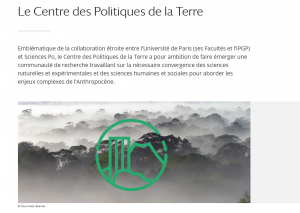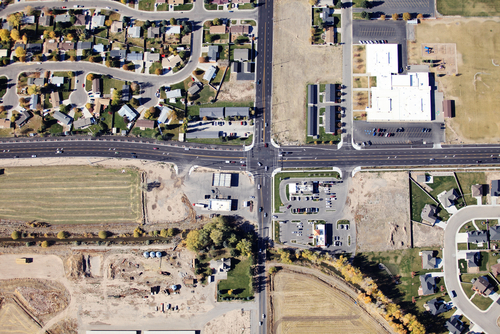


When Courts are the Metronome of Productivity
8 July 2021
Curricula and Jobs: Understanding Gender Segregation
8 July 2021
Climate march, Paris 28 March 2021 by Jeanne Mejoulet, CC BY 2.0, via Flickr
A New Research Area
Interest in the results of public policies is growing among public institutions and civil society, while the environmental crisis is gaining importance on every level. Sciences Po has therefore expanded the scope of its Laboratory for interdisciplinary evaluation of public policies (LIEPP), in collaboration with Université de Paris, to include environmental issues. Presentation by Charlotte Halpern, head of this new programme.
You recently took charge of LIEPP’s new research area, ‘environmental policies’. Why is it important to evaluate environmental policies?
Charlotte Halpern: Environmental transformations and the climate emergency justify the introduction of a series of reforms and measures to accelerate the transition of modern societies and economies towards carbon neutrality by 2050. These measures also aim to reduce social/environmental inequalities and to ensure sustainable transformation of territorial development strategies. This new generation of public policies adds another layer to the decades of promises concerning environmental protection, sustainable development, green growth and energy transition. The climate agenda is attracting unprecedented attention as well as strong opposition from European citizens, who express their opinions in the streets, via social media and the ballot boxes.
This research area analyses the efforts made by public policies in the field of the environment, in the widest possible sense, including sustainable development, climate change, green growth and its more recent additions, energy and ecological transitions, to explain the transition dynamics at play and to enlighten the decisions of stakeholders and decision makers. What role is played by public policies and stakeholders in driving and coordinating these transitions? What resources are implemented to put these transversal objectives into operation? How, using which levers, at what pace and to what extent will these schemes transform our current systems? What sectoral and territorial variations can be seen? What results have been observed? Which social groups, territories and economic sectors benefit most? What effects do they have on political systems and their varying capacities to integrate climate issues?
What are the goals for this new research area?
C. H.: The first goal is to encourage research on the evaluation of environmental policies, particularly the production of data, expertise and knowledge, and the limits of public action.
There is also an analytical and methodological objective, which involves comparing the theoretical approaches and survey methods used in the fields of social sciences (political science, economics, sociology), natural and life sciences. In this respect, the creation of this research area, coinciding with the collaboration between LIEPP and Université de Paris, offers new opportunities. An interdisciplinary grounding offers a way of responding to the challenges inherent to the evaluation of environmental policies, while taking into account their particularities: multiple levels, a wide range of instruments (law, tax, incentives, etc.), separate time scales, and the uncertainties that weigh upon some ongoing transformations. More specifically, the activities carried out by this research area, based on very specific objects (urban heat islands, digital sobriety, circular economy, etc.), will bring up the question of the evaluation of environmental policies and their role in determining transition trajectories.
 One final objective consists in building a research community around the evaluation of environmental policies, and to bring the work carried out by Sciences Po and Université de Paris researchers to the attention of a broader audience. Our projects will thus complement the activities already in place at Sciences Po in the interdisciplinary workshop on environmental research (AIRE) and the Earth Politics Centre. They may also be related to the projects of other areas of LIEPP, such as the evaluation of social and fiscal policies with a focus on how to fund adaptations to climate change and the ecological transition, discrimination and the evaluation of democracy to analyse scientific scepticism or to evaluate forms of political participation.
One final objective consists in building a research community around the evaluation of environmental policies, and to bring the work carried out by Sciences Po and Université de Paris researchers to the attention of a broader audience. Our projects will thus complement the activities already in place at Sciences Po in the interdisciplinary workshop on environmental research (AIRE) and the Earth Politics Centre. They may also be related to the projects of other areas of LIEPP, such as the evaluation of social and fiscal policies with a focus on how to fund adaptations to climate change and the ecological transition, discrimination and the evaluation of democracy to analyse scientific scepticism or to evaluate forms of political participation.
Which approaches will be preferred by the environmental policies area?
C. H.: In addition to an interdisciplinary approach, we have determined certain standpoints for our work. A processual approach will be preferred to report the transition trajectories and identify the parties and mechanisms involved, thus completing a results-centred approach. Comparison between sectors is another important element to take into account the dynamics specific to environmental policies and the greening of sectoral policies (agriculture, transport, energy, etc.), as well as the comparison between political and institutional contexts, mostly in Europe, to evaluate the action capacities set up at different levels of governance. Public policies will also be analysed through their objectives and the resources and procedures implemented; this will contribute to the debate on the role of public policies and forms of governance in transition trajectories.
How do you plan to develop the research area?
C. H.: Several actions have already been initiated since the area was created in April 2020. Firstly, a systematic literature review is being carried out by Nathalia Capellini. This project aims to clarify, from an interdisciplinary viewpoint, the objectives and methods to guide the evaluation of environmental policies, the preferred analytical dimensions and the factors that explain the role played by political regulations in the dynamics observed.

In Copenhagen there are 672,000 bicycles, five times as many as cars”, October 2019 © Citycle
A second task involves identifying and contacting the research teams working on the evaluation of environmental policies at Sciences Po and Université de Paris, and encouraging them to collaborate. This will initially be via LIEPP’s transversal activities and calls for projects. The Young Research call for projects supports the work of Charlotte Glinel (sociologist, CSO – Sciences Po) on the transformation of French forests to tackle climate change, Hugo Rochard’s project (geography, earth and environmental sciences, LADYSS – Université de Paris) on the relations between urban environmental policies and citizen movements in Greater Paris and New York, and the project of Blandine Mesnel (political scientist, CEE – Sciences Po), who is comparing how farmers in France and Spain have experienced the common agricultural policy. Following LIEPP’s general call for projects, the research area will be hosting the project entitled Understanding the role of public authorities and their relations with public policies to reduce social and environmental inequalities proposed by Nathalie Blanc (Université de Paris, LADYSS) and Jean Chiche (IRHC research engineer at CNRS and Sciences Po, CEVIPOF).
We also plan to organise snowball seminars and webinar debates to encourage discussions between researchers from different structures, working on similar topics with different disciplinary perspectives. One example is the evaluation of policies to fight urban warming, which resulted in a webinar debate: ‘The impact of climate change on urban health: the Lancet countdown’s 2020 report launch event in France’, organised in collaboration with the Earth Politics Centre, the Lancet Countdown initiative, the Centre Virchow Villermé for Public Health and the French medical council. This discussion was followed by a snowball seminar on the evaluation of policies to fight urban warming. In parallel to this interest in urban warming, other snowball seminars on sobriety policies and vegetarianism are also being considered.
The publication of several Policy Briefs, like that of Jean-Noël Jouzel on the evaluation of the risks of pesticides on workers’ health, will garner attention from decision makers. Another Policy brief is currently being written in collaboration with Nathalia Capellini and Francesco Sarti (Sciences Po, CEE) reporting the results of the MORE project on the reallocation of road space and its effects on urban mobility.
We welcome any contribution suggestions on these various formats!
Interview by Sofia Cerda Aparicio, LIEPP
Charlotte Halpern is an FNSP research fellow at the Center for European studies and comparative policy (CEE). An expert in comparative public action, she researches transformations in public action. Her research particularly focuses on environmental public policies and sustainable cities, territorial governance and transportation and infrastructure public policies, and the management of urban collective services.




